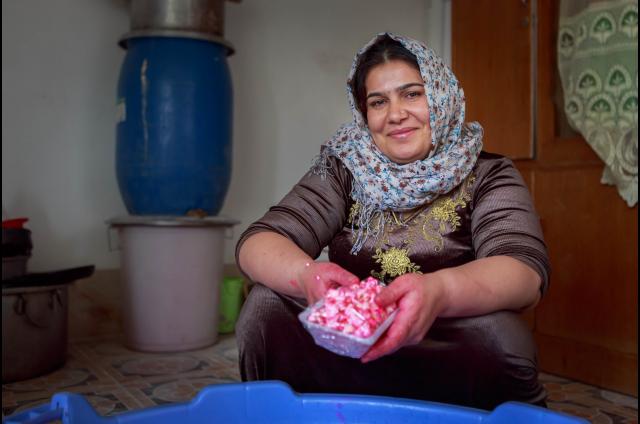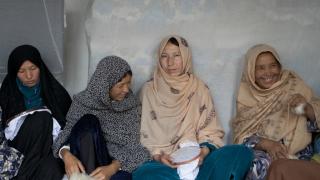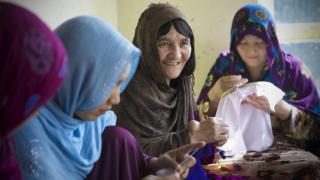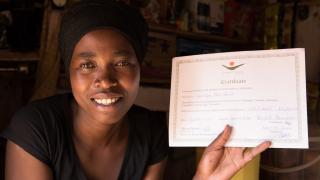Keeping the window open
connecting short-term economic responses with long-term empowerment support for women
Today, Women for Women International with the LSE Centre for Women, Peace and Security and the Gender Action for Peace and Security launched a research report that looks at the livelihood needs and opportunities of Syrian women refugees and internally displaced women in the Kurdistan Region of Iraq (KRI), predominantly based on interviews and discussions with those women.
Many of the people living in KRI have been displaced for years with little prospect of returning ‘home’ in the near-future. Iraqis, like Raja, have been displaced multiple times. Some have built houses in ‘camps’ and others live in host communities. In this context, everyone has to work.
Raja's Story
Since 2008, Raja has been intermittently displaced by conflict in Iraq. She has been raising her 5 children alone in a camp for internally displaced people in the Kurdistan Region of Iraq since 2015.
“Before, women only did housework, there weren’t any jobs or training courses for them – only men worked. Now, here in the camp, women are working and men are staying at home because there is no work for men.”
For women, this necessity can be a window of opportunity – allowing them to gain confidence, status and independence as well as more freedom of movement than they would have previously been allowed.
Desperation for the household can override the discrimination that women previously faced and lead to changes in people’s perceptions around what women should or shouldn’t do. And this is not unique to the women in KRI: we saw this in the UK in the First World War where women started working like never before – an important catalyst for some women getting the right to vote in the UK in 1918.
“I never thought that one day I’d work – there were very few working women back in Syria, apart from some seamstresses and hairdressers. But now it is different – in the KRI, Syrian women are working more than men. It is no longer considered shameful for a woman to support the family.” Alia, Syrian refugee
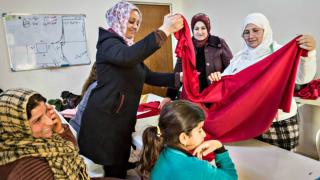
This window, however, can quickly close and all progress in improving gender norms can be lost. The challenge, therefore, is to ensure that short-term support for women’s economic participation (e.g. livelihood support or cash transfers) is connected to a longer-term vision for women’s economic empowerment. This means that women are not only earning money, but are also able to make or influence decisions about how that money is saved, spent or invested as well as broader economic decisions in their communities.
For this research, we spoke to a wide variety of women affected by conflict and their voices were clear: this window has to stay open. Over the last year, Women for Women International has been working with Raja and Alia and 1,527 other women in KRI supporting their economic empowerment and access to services and we are deeply concerned by the reduction in international support for them and the lack of meaningful engagement with women to understand their needs.
Recommendations
What international governments and donors should do
Based on the findings from our research, we are calling on international governments and donors to increase and clearly link short-term economic support for women with a longer, more sustainable approach to women’s economic empowerment. This must include:
- Prioritising holistic support for women by ensuring that livelihood support is complemented by improving women’s access to services and providing women’s rights education;
- Supporting women’s leadership and urgently increasing funding for women’s rights organisations so that they can provide vital, needs-based long-term and varied programming.
- Supporting women’s economic programmes that include men to help change harmful norms.
- Building political and institutional support for both women’s economic empowerment and funding local and international organisations that provide such support.
We will be taking these findings forward as we work with the UK Government to deliver on its commitments, including the new National Action Plan on Women, Peace and Security and Strategic Vision for Gender Equality.
Find out more about the report here and listen more to Alia and Raja.
Continue reading
When it comes to protecting women’s rights in conflict-affected countries, it’s time to turn resolutions into reality. The UK’s new Plan is a step in the right direction.
Women for Women International is providing programme graduates in Afghanistan with advanced training in advocacy and leadership skills through a dedicated, three-month programme and supporting them to identify the changes they want to see and advocate for them.
This International Women’s Day, one of our Rwanda programme graduates, Clarisse, shares her inspiring story of beating the odds to become a successful businesswoman.

